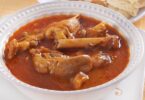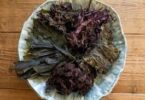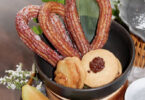Monitoring Desk
Your diet determines not only your weight and overall health — food choices also affect your oral health. Depending on what you eat, you could be feeding the good, or the bad, bacteria in your mouth, and that will affect your smile. Studies have shown that older adults who eat plenty of fruits and vegetables, for example, have better oral health than those who don’t.
“This type of eating pattern, which is low in sugar but high in fiber, is a major factor to help prevent cavities and keep teeth and gums strong and healthy,” said Mark Wolff, dean of the University of Pennsylvania School of Dental Medicine, according to AARP.
Here are some specific examples of foods dental experts and researchers recommend to improve oral hygiene:
Apples. This popular fruit helps clean your teeth and keep your breath fresh. Eating hard fruits and vegetables like apples, carrots and celery help remove odor-causing plaque and food particles, says WebMD.
Tap water. Drinking tap water that contains fluoride helps make teeth more resistant to acid that can cause cavities, Matthew Messina, professor of clinical dentistry at Ohio State College of Dentistry, tells AARP. Even drinking water itself helps clean teeth by washing away leftover foods and acid that can cause dental decay and tooth erosion.
Cheese. Dairy products such as milk, cheese and yogurt contain calcium and phosphates which help replace minerals that are lost when you consume other kinds of foods. Cheese contains casein, a protein that stabilizes and repairs tooth enamel. Wolff recommends choosing yogurt with fewer than 10 grams of sugar per serving to reduce the risk of tooth decay, especially in children.
Lean protein. Poultry, fish, eggs, and lean cuts of beef are rich in phosphorus, a mineral that helps strengthen teeth by protecting and building tooth enamel. Protein is also important to repair gums, says AARP, a problem for many older adults. Wolff says that often seniors do not eat enough protein because it is harder for them to chew, especially if they’ve lost teeth.
Sugarless gum. Chewing sugarless gum for 20 minutes after every meal helps create more saliva, which not only prevents dry mouth, but also adds more calcium and phosphate to the saliva to strengthen tooth enamel.
Green and black teas. These teas contain polyphenols that interact with plaque bacteria, say experts at the University of Rochester Medical Center. The polyphenols kill bacteria or prevent them from manufacturing acid that attacks teeth. If your water has fluoride, a cup of tea can be a great source of this mineral.
Courtesy: (Newsmax)






